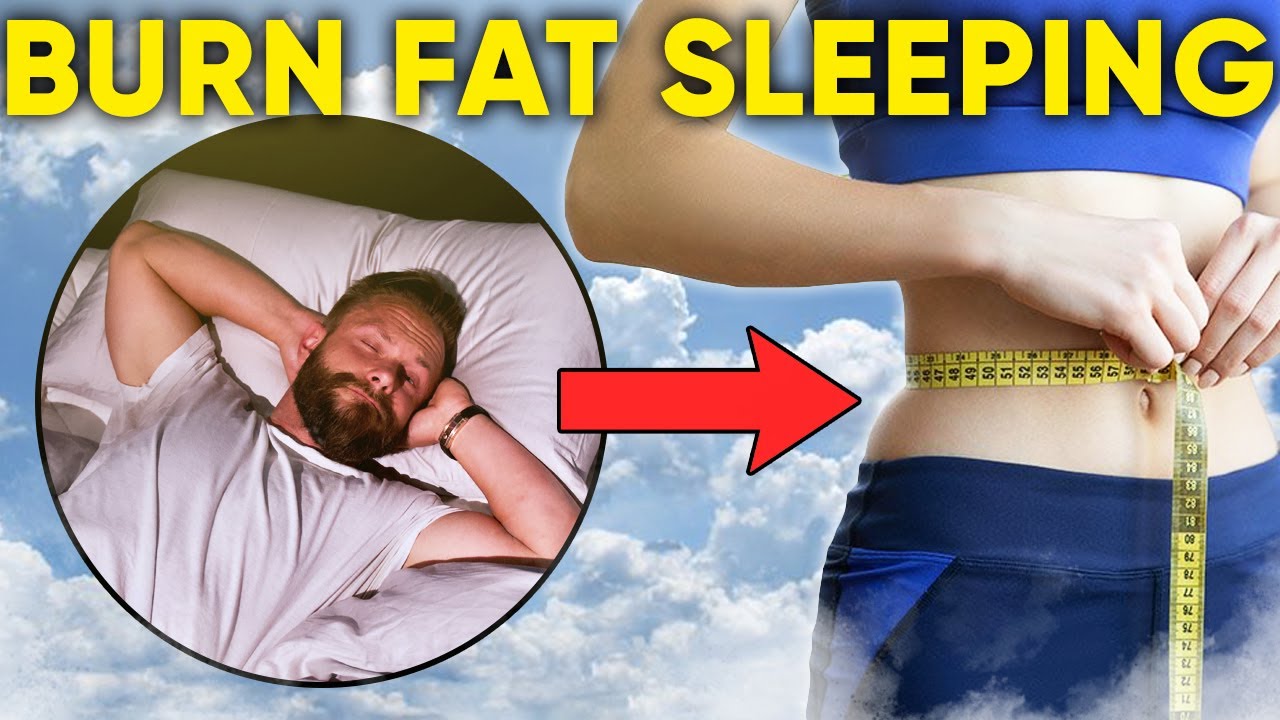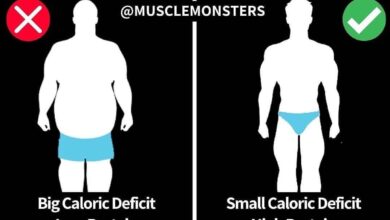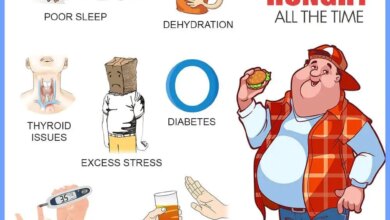
Weight Loss Strategies That Work While You Sleep
Weight Loss Strategies That Work While You Sleep: Imagine shedding pounds while you snooze! It might sound too good to be true, but the connection between sleep and weight management is undeniable. Our bodies work tirelessly during sleep, regulating hormones like leptin and ghrelin, which play a crucial role in appetite and metabolism.
Sleep deprivation can wreak havoc on our weight, leading to increased hunger and cravings. But don’t despair, there are proven strategies that can help you optimize your sleep for weight loss success.
This article delves into the fascinating world of sleep and weight loss, exploring strategies that can help you unlock the power of slumber to achieve your weight goals. From establishing a consistent sleep schedule to creating a relaxing bedtime routine, we’ll cover a range of actionable tips to enhance your sleep quality and promote weight management.
So, get ready to embrace the transformative power of sleep and unlock your weight loss potential.
Understanding Sleep and Weight Loss: Weight Loss Strategies That Work While You Sleep
You might be surprised to learn that getting enough sleep is crucial for effective weight management. While we often focus on diet and exercise, sleep plays a vital role in regulating hormones that influence appetite and metabolism.
The Role of Hormones in Sleep and Appetite
Sleep deprivation can disrupt the delicate balance of hormones that control our hunger and satiety. Two key players in this process are leptin and ghrelin. Leptin, often referred to as the “satiety hormone,” signals to our brains that we’re full, reducing appetite.
Getting enough sleep is a key weight loss strategy, but don’t forget about healthy eating! For a delicious and satisfying snack, try chickpeas – they’re packed with protein and fiber. Check out delicious ways to use chickpeas under 360 calories for some inspiration.
With a good night’s sleep and nutritious snacks, you’ll be well on your way to reaching your weight loss goals.
Ghrelin, on the other hand, is the “hunger hormone,” stimulating appetite and promoting food intake.
- When we sleep adequately, our bodies produce sufficient leptin, helping us feel full and satisfied after meals.
- Conversely, sleep deprivation leads to a decrease in leptin levels, making us feel hungrier and more likely to overeat.
- At the same time, sleep deprivation increases ghrelin production, further amplifying our hunger cues.
The Impact of Sleep Deprivation on Weight Gain
Numerous studies have demonstrated a strong link between insufficient sleep and weight gain.
- For instance, a study published in the journal “Sleep” found that people who slept less than six hours per night were more likely to be overweight or obese than those who slept seven to eight hours.
- Another study, published in the journal “Obesity,” showed that sleep-deprived individuals had increased levels of ghrelin and decreased levels of leptin, leading to increased appetite and food cravings.
“Sleep deprivation has been linked to a range of health problems, including weight gain, obesity, diabetes, heart disease, and depression.”
National Sleep Foundation
Sleep-Related Weight Loss Strategies
Improving your sleep quality can significantly contribute to your weight loss journey. When you sleep well, your body releases hormones that regulate appetite and metabolism, leading to better weight management.
Strategies for Improving Sleep Quality
A good night’s sleep is crucial for overall health and well-being, including weight management. Here are some proven strategies to enhance your sleep quality:
- Establish a Consistent Sleep Schedule:Go to bed and wake up around the same time every day, even on weekends, to regulate your body’s natural sleep-wake cycle.
- Create a Relaxing Bedtime Routine:Wind down an hour or two before bed with calming activities like taking a warm bath, reading a book, or listening to soothing music. Avoid screen time before bed, as the blue light emitted from electronic devices can interfere with melatonin production.
While sleep is essential for overall health, it can also play a role in weight loss. Getting enough sleep helps regulate hormones that control hunger and metabolism. But what about those late-night cravings? Can you still enjoy your favorite pasta dishes without derailing your weight loss goals?
The answer is yes, as long as you choose the right kind of pasta and portion sizes. Can pasta be healthy ? The key is to opt for whole-grain pasta and pair it with lean protein and vegetables. By making smart choices, you can enjoy your pasta while still working towards your weight loss goals.
- Optimize Your Sleep Environment:Ensure your bedroom is dark, quiet, and cool. Invest in blackout curtains, a white noise machine, or earplugs to minimize distractions. Make sure your bed is comfortable and supportive.
- Avoid Caffeine and Alcohol Before Bed:Caffeine and alcohol can disrupt sleep patterns. Limit your intake of these substances in the hours leading up to bedtime.
- Regular Exercise:Regular physical activity can improve sleep quality, but avoid exercising too close to bedtime. Aim for at least 30 minutes of moderate-intensity exercise most days of the week.
- Limit Naps:While short naps can be beneficial, long or frequent naps can interfere with nighttime sleep. If you need to nap, keep it short (20-30 minutes) and avoid napping late in the afternoon.
- See a Doctor:If you consistently struggle with sleep, consult a healthcare professional to rule out any underlying medical conditions that may be affecting your sleep.
Benefits of a Consistent Sleep Schedule
Maintaining a consistent sleep schedule helps regulate your body’s natural sleep-wake cycle, also known as the circadian rhythm. This rhythm influences hormone production, body temperature, and other bodily functions.
While we sleep, our bodies work hard to repair and rebuild. To support this process, prioritize a healthy diet and make sure you’re getting enough sleep. A balanced diet rich in protein, healthy fats, and fiber can help your body recover and build muscle overnight.
Check out these diets and recipes for meal-worthy salads for some inspiration! Not only are salads delicious and satisfying, but they’re also packed with nutrients that can fuel your body for optimal sleep and recovery.
- Improved Sleep Quality:A consistent sleep schedule helps train your body to fall asleep and wake up at regular times, leading to better sleep quality and reduced sleep disturbances.
- Enhanced Metabolism:A consistent sleep schedule promotes healthy hormone production, including leptin and ghrelin, which regulate appetite and metabolism. This can help you manage your weight more effectively.
- Reduced Risk of Chronic Diseases:Studies have shown that people who maintain a consistent sleep schedule have a lower risk of developing chronic diseases such as heart disease, diabetes, and obesity.
Sleep Hygiene Checklist
Establishing good sleep hygiene habits is essential for improving your sleep quality. Here is a checklist of actionable steps you can implement:
- Create a Consistent Sleep Schedule:Go to bed and wake up around the same time each day, even on weekends.
- Limit Screen Time Before Bed:The blue light emitted from electronic devices can interfere with melatonin production, making it harder to fall asleep. Avoid screen time for at least an hour before bed.
- Create a Relaxing Bedtime Routine:Engage in calming activities like taking a warm bath, reading a book, or listening to soothing music to signal your body that it’s time to wind down.
- Optimize Your Sleep Environment:Make sure your bedroom is dark, quiet, and cool. Use blackout curtains, earplugs, or a white noise machine to minimize distractions.
- Avoid Caffeine and Alcohol Before Bed:Caffeine and alcohol can interfere with sleep patterns. Limit your intake of these substances in the hours leading up to bedtime.
- Regular Exercise:Aim for at least 30 minutes of moderate-intensity exercise most days of the week, but avoid exercising too close to bedtime.
- Limit Naps:Short naps can be beneficial, but long or frequent naps can interfere with nighttime sleep. If you need to nap, keep it short (20-30 minutes) and avoid napping late in the afternoon.
Impact of Environmental Factors on Sleep
Environmental factors play a significant role in sleep quality. It’s essential to create a sleep-conducive environment by minimizing distractions and optimizing your bedroom for sleep.
- Light:Light exposure can affect your body’s natural sleep-wake cycle. Minimize exposure to bright light in the evening and ensure your bedroom is dark at night. Use blackout curtains to block out streetlights and other sources of light.
- Noise:Noise can disrupt sleep, making it difficult to fall asleep or stay asleep. Use earplugs, a white noise machine, or a fan to minimize noise distractions. Consider moving your bedroom away from noisy areas like traffic or construction.
- Temperature:The ideal bedroom temperature for sleep is between 60-67 degrees Fahrenheit (15-19 degrees Celsius). A cool bedroom helps regulate body temperature and promotes sleep.
Tips for Creating a Relaxing Bedtime Routine
A relaxing bedtime routine can help signal your body that it’s time to wind down and prepare for sleep. Here are some tips for creating a soothing routine:
- Take a Warm Bath or Shower:The warmth of a bath or shower can help relax your muscles and prepare your body for sleep. Add essential oils like lavender or chamomile for an extra calming effect.
- Read a Book:Reading a book can help distract your mind from daily stresses and promote relaxation. Choose a calming book and avoid reading on electronic devices.
- Listen to Soothing Music:Classical music, nature sounds, or binaural beats can help create a calming atmosphere and promote relaxation.
- Practice Mindfulness or Meditation:Mindfulness or meditation techniques can help calm your mind and reduce anxiety, making it easier to fall asleep.
Dietary Strategies for Weight Loss During Sleep
While you sleep, your body continues to work hard, including burning calories. Optimizing your diet can enhance this process and support your weight loss goals.
Nighttime Metabolism and Weight Management
Nighttime metabolism refers to the metabolic processes that occur while you sleep. During this time, your body continues to burn calories for essential functions like breathing, cell repair, and hormone production. A slower metabolism can lead to weight gain, as your body burns fewer calories at rest.
Impact of Late-Night Snacking on Weight Gain
Late-night snacking can disrupt your sleep, increase calorie intake, and lead to weight gain. When you eat close to bedtime, your body doesn’t have enough time to digest the food before you go to sleep, which can lead to indigestion and discomfort.
Additionally, eating late at night can disrupt your body’s natural hormone balance, leading to increased appetite and cravings the next day.
Foods That Promote Restful Sleep and Weight Loss
Choosing the right foods can promote restful sleep and support weight loss. Here are some examples:
- High-protein foods:Protein helps keep you feeling full and satisfied, reducing cravings and overeating. Good sources include lean meats, poultry, fish, eggs, beans, and lentils.
- Complex carbohydrates:Complex carbs provide sustained energy and promote restful sleep. Look for whole grains, fruits, and vegetables.
- Healthy fats:Healthy fats, like those found in avocados, nuts, and seeds, help regulate blood sugar levels and promote satiety.
- Foods rich in tryptophan:Tryptophan is an amino acid that helps produce serotonin and melatonin, which are important for sleep regulation. Good sources include turkey, chicken, eggs, dairy products, and nuts.
- Foods rich in magnesium:Magnesium helps relax muscles and promote sleep. Good sources include leafy green vegetables, almonds, avocado, and dark chocolate.
Healthy Pre-Sleep Snacks
Here are some healthy and satisfying pre-sleep snack ideas that can help you feel full and satisfied without disrupting your sleep:
- Greek yogurt with berries:Greek yogurt is a good source of protein and calcium, while berries are rich in antioxidants and fiber.
- A handful of almonds:Almonds are a good source of protein, fiber, and healthy fats.
- A small bowl of oatmeal:Oatmeal is a good source of complex carbohydrates and fiber, which can help promote restful sleep.
- A slice of whole-wheat toast with avocado:Avocado is a good source of healthy fats and fiber, which can help keep you feeling full and satisfied.
Exercise and Weight Loss During Sleep

While we sleep, our bodies continue to work hard, repairing and rebuilding tissues, regulating hormones, and processing energy. Engaging in regular physical activity can significantly enhance the quality of our sleep and contribute to successful weight management.
The Role of Physical Activity in Promoting Sleep Quality, Weight loss strategies that work while you sleep
Regular exercise has a profound impact on sleep quality. It can help regulate our circadian rhythm, the natural sleep-wake cycle, and promote the production of melatonin, a hormone that regulates sleep. Studies have consistently shown that individuals who engage in regular physical activity experience improved sleep quality, including longer sleep duration, fewer awakenings during the night, and a more restful sleep.
Benefits of Incorporating Strength Training into a Weight Loss Program
Strength training is a crucial component of a comprehensive weight loss program. It not only helps build muscle mass, which boosts metabolism and burns calories even at rest, but also improves insulin sensitivity, making it easier for the body to utilize glucose for energy.
This can lead to reduced fat storage and improved weight management.
The Impact of Exercise Timing on Sleep and Weight Management
The timing of exercise can influence both sleep quality and weight management. Research suggests that engaging in moderate-intensity exercise in the late afternoon or early evening may be optimal for promoting restful sleep. This is because exercise can increase core body temperature, and allowing time for it to cool down before bedtime can help regulate the sleep-wake cycle.
However, exercising too close to bedtime can interfere with sleep. Additionally, studies have shown that individuals who engage in regular physical activity, regardless of the time of day, tend to have a lower body mass index (BMI) and a reduced risk of obesity.
Other Factors Influencing Weight Loss During Sleep

While sleep quality, diet, and exercise play pivotal roles in weight management, other factors can significantly impact your weight loss journey, particularly during sleep. Understanding and addressing these factors can further optimize your efforts for achieving your desired weight.
Stress Management and Sleep
Managing stress is crucial for promoting both sleep quality and weight loss. Chronic stress can disrupt sleep patterns, leading to sleep deprivation and increased cortisol levels. Cortisol is a stress hormone that can stimulate appetite and promote fat storage. When sleep is compromised due to stress, the body’s ability to regulate appetite hormones like leptin and ghrelin is disrupted, leading to increased hunger and cravings.
Hydration and Sleep Quality
Adequate hydration is essential for optimal sleep and metabolic function. Dehydration can lead to sleep disturbances, including insomnia and restless sleep. It can also negatively impact metabolism by slowing down the rate at which your body burns calories.
Creating a Supportive Sleep Environment
A conducive sleep environment can significantly contribute to better sleep quality and overall well-being. Here are some tips for creating a sleep-friendly space:
- Maintain a cool and comfortable room temperature. The ideal temperature for sleep is around 65 degrees Fahrenheit.
- Ensure the room is dark and quiet. Light and noise can disrupt sleep cycles.
- Use blackout curtains or an eye mask to block out light.
- Consider using a white noise machine or earplugs to minimize noise disturbances.
- Create a relaxing bedtime routine that helps signal your body that it’s time to sleep. This could include taking a warm bath, reading a book, or listening to calming music.
End of Discussion

The link between sleep and weight loss is undeniable. By prioritizing sleep hygiene, incorporating mindful dietary choices, and engaging in regular physical activity, you can tap into the power of slumber to support your weight management journey. Remember, sleep is not just about resting; it’s a fundamental pillar of overall health and well-being.
By embracing a holistic approach that prioritizes sleep, you can unlock your body’s natural weight loss mechanisms and embark on a journey towards a healthier, happier you.






